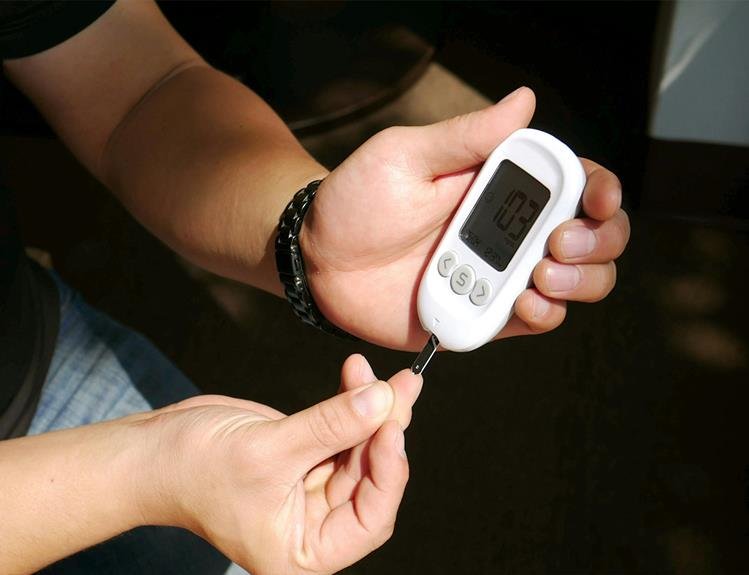Diabetic Neuropathy and Exercise: Tips for Safe Physical Activity
Are you hesitant about incorporating exercise into your routine due to diabetic neuropathy concerns?
While it may seem daunting, understanding the right approach can make physical activity not only safe but also beneficial for managing your condition.
By learning about the types of exercises that are suitable, taking necessary precautions, and gradually building up your activity level, you can pave the way for a healthier lifestyle.
But how can you ensure that you're making the right choices for your well-being?
Importance of Exercise
Exercise plays a crucial role in managing diabetic neuropathy by improving blood circulation and nerve function. By engaging in regular physical activity, you can help increase the flow of oxygen and nutrients to your nerves, which can reduce symptoms such as numbness, tingling, and pain. Additionally, exercise can help control blood sugar levels, which is essential in managing diabetes and preventing further nerve damage.
When you exercise, your body releases endorphins, which are natural painkillers that can help alleviate discomfort associated with diabetic neuropathy. Furthermore, physical activity can improve your overall cardiovascular health, lowering your risk of other diabetes-related complications.
To reap the benefits of exercise, it's important to choose activities that you enjoy and that are safe for your condition. Consult with your healthcare provider before starting any new exercise routine to ensure it's suitable for you. Remember, consistency is key, so aim for regular, moderate exercise to effectively manage diabetic neuropathy and improve your quality of life.
Understanding Diabetic Neuropathy
Understanding diabetic neuropathy is crucial for managing your condition effectively. You need to grasp the basics of neuropathy, recognize key symptoms to watch for, and understand how to best manage and treat this complication of diabetes.
Neuropathy Basics Explained
Diabetic neuropathy is a condition that affects the nerves due to prolonged high blood sugar levels. The excess sugar in your blood can injure the walls of the tiny blood vessels that nourish the nerves, particularly in your legs.
When these nerves are damaged, they may send signals slowly or not at all, leading to various complications. This condition can cause tingling, numbness, or pain in your extremities, making it challenging to sense pressure or temperature changes. It can also affect your digestion, heart rate, and bladder function.
Understanding the basics of neuropathy is crucial for managing the condition effectively and preventing further complications, highlighting the importance of proper care and attention.
Symptoms to Watch
When experiencing diabetic neuropathy, pay close attention to subtle changes in sensation or function in your extremities. These changes may include tingling, numbness, burning sensations, or muscle weakness.
Keep an eye out for any cuts, sores, or blisters on your feet that are slow to heal, as this could indicate nerve damage. Watch for difficulties with coordination, balance, or walking, as these can be signs of neuropathy affecting the nerves that control muscle movement.
If you notice any of these symptoms, consult your healthcare provider promptly. Early detection and management of diabetic neuropathy symptoms are crucial in preventing further nerve damage and complications.
Regular monitoring and timely intervention can help maintain your quality of life.
Management and Treatment
To effectively manage and treat diabetic neuropathy, it's essential to prioritize regular monitoring and timely intervention to maintain your quality of life. Monitor your blood sugar levels consistently to keep them within the target range recommended by your healthcare provider. Proper foot care is crucial to prevent complications like ulcers or infections.
Your doctor may recommend medications to help manage symptoms such as pain or tingling. Physical therapy can improve strength and coordination, while regular exercise can help control blood sugar levels and improve circulation. A healthy diet plays a vital role in managing neuropathy, so focus on eating balanced meals and controlling portion sizes.
Benefits of Physical Activity
Regular physical activity plays a crucial role in managing diabetic neuropathy and improving overall health. By engaging in regular exercise, you can experience numerous benefits that can positively impact your condition. Physical activity helps improve blood circulation, which is essential for reducing nerve damage caused by diabetes. It also helps control blood sugar levels, leading to better management of symptoms associated with diabetic neuropathy. Additionally, exercise can help you maintain a healthy weight, reduce inflammation in the body, and improve your overall physical fitness.
Moreover, engaging in physical activity can boost your mood and reduce stress levels, which are common among individuals dealing with chronic conditions like diabetic neuropathy. Regular exercise can also enhance your energy levels and improve your quality of sleep, contributing to better overall well-being. Remember that even small amounts of exercise can make a significant difference, so find activities that you enjoy and incorporate them into your daily routine to experience these benefits firsthand.
Types of Safe Exercises
Engaging in safe and suitable exercises is essential for managing diabetic neuropathy and improving your overall health. When dealing with diabetic neuropathy, it's crucial to focus on exercises that enhance circulation, flexibility, and strength without causing further damage. Low-impact activities like walking, swimming, and cycling are excellent choices as they're gentle on your joints while providing cardiovascular benefits. Strength training exercises using light weights or resistance bands can help improve muscle tone and stability, reducing the risk of falls, a common concern for those with neuropathy.
Yoga and tai chi are also beneficial for diabetic neuropathy as they focus on balance, flexibility, and relaxation. These mind-body exercises can help alleviate stress, improve posture, and enhance your overall well-being. Additionally, incorporating stretching routines into your daily regimen can help prevent muscle stiffness and improve range of motion.
Remember to always consult with your healthcare provider or a physical therapist to determine the most suitable exercise plan for your specific condition and health goals.
Precautions to Take
Ensure proper footwear and adequate hydration when engaging in exercises to minimize the risk of injury and optimize your workout experience. When dealing with diabetic neuropathy, taking precautions is essential to ensure your safety during physical activity.
Firstly, always inspect your feet for any signs of blisters, sores, or cuts before and after exercise, as neuropathy can reduce your ability to feel pain in your feet. Additionally, choose well-fitting athletic shoes with good support to prevent foot injuries while exercising.
It's crucial to monitor your blood sugar levels before, during, and after workouts to prevent hypoglycemia or hyperglycemia. Carry a snack with you in case your blood sugar drops unexpectedly. Be mindful of the surfaces you exercise on to avoid falls and injuries, opting for flat, even terrain.
Lastly, listen to your body and stop exercising if you experience any unusual symptoms like dizziness, chest pain, or extreme fatigue. By taking these precautions, you can enjoy the benefits of exercise while minimizing the risks associated with diabetic neuropathy.
Tips for Starting Slowly
To ease into your exercise routine with diabetic neuropathy, consider starting gradually to prevent overexertion and minimize the risk of injury. Begin with low-impact activities like walking, swimming, or cycling to gauge your body's response. Start with short sessions, perhaps 10-15 minutes, and gradually increase the duration as you feel more comfortable.
Listen to your body and don't push through pain or discomfort. It's essential to warm up before exercising to prepare your muscles and nerves for activity. Gentle stretches and range-of-motion exercises can help loosen tight muscles and improve flexibility. Remember to cool down after your workout to gradually lower your heart rate and prevent muscle stiffness.
Stay hydrated and wear appropriate footwear to protect your feet. Consulting with a healthcare provider or a certified exercise physiologist can help you develop a safe and effective exercise plan tailored to your needs. By starting slowly and progressively increasing your activity level, you can improve your fitness while managing your diabetic neuropathy effectively.
Monitoring Blood Sugar Levels
Regularly checking your blood sugar levels is crucial in managing your diabetic neuropathy effectively. By monitoring your blood sugar levels before and after exercise, you can better understand how physical activity impacts your body and make informed decisions to keep your levels within a healthy range.
Before starting any exercise routine, it's essential to check your blood sugar levels to ensure they're stable. During exercise, monitor your levels periodically, especially if you experience symptoms like dizziness, confusion, or sweating excessively. If your blood sugar levels are too low (hypoglycemia), have a snack with fast-acting carbohydrates to raise them. On the other hand, if your levels are too high (hyperglycemia), avoid strenuous exercise and consult with your healthcare provider.
Keeping a log of your blood sugar readings before, during, and after exercise can help you identify patterns and adjust your routine accordingly. Remember, maintaining proper blood sugar levels is key to managing diabetic neuropathy and staying healthy.
Consulting With Healthcare Provider
Schedule a consultation with your healthcare provider to discuss your diabetic neuropathy and how exercise can fit into your overall treatment plan. Your healthcare provider can provide valuable insights tailored to your specific condition and medical history. During this consultation, be prepared to share details about your current symptoms, any limitations you may have, and your exercise goals.
Your healthcare provider can help you determine the types of exercises that are safe and beneficial for your diabetic neuropathy. They can also offer guidance on how to monitor your blood sugar levels before, during, and after physical activity. Additionally, they may recommend specific precautions to take to prevent injury and manage any potential complications related to your condition.
This consultation is an essential step in creating a personalized exercise plan that supports your overall health and well-being while taking into account the specific challenges posed by diabetic neuropathy. By working closely with your healthcare provider, you can ensure that your exercise routine is both effective and safe.
Frequently Asked Questions
Can I Still Exercise if I Have Diabetic Neuropathy?
Yes, you can exercise with diabetic neuropathy. Prioritize low-impact activities like walking or swimming. Consult your healthcare provider for tailored advice. Monitor your blood sugar levels and listen to your body. Stay safe and enjoy staying active.
Are There Any Specific Exercises That Should Be Avoided for Individuals With Diabetic Neuropathy?
When managing diabetic neuropathy, avoid high-impact activities like running or jumping that may worsen nerve damage. Opt for low-impact exercises like swimming or cycling instead. Always consult with your healthcare provider before starting any new workout routine.
How Often Should I Monitor My Blood Sugar Levels During Exercise?
During exercise, monitor your blood sugar levels every 30 minutes or as recommended by your healthcare provider. This helps ensure you stay within a safe range and can adjust your activity or intake as needed.
Are There Any Supplements or Medications That Can Help Manage Diabetic Neuropathy Symptoms During Exercise?
When managing diabetic neuropathy symptoms during exercise, consult your healthcare provider before taking any supplements or medications. They can provide guidance on safe options that may help alleviate discomfort and improve your workout experience.
What Are Some Signs That Indicate I Should Stop Exercising and Seek Medical Attention?
If you experience chest pain, severe shortness of breath, dizziness, fainting, or sudden weakness during exercise, it's essential to stop immediately and seek medical attention. Your safety is a priority, so listen to your body.
Conclusion
So, if you have diabetic neuropathy, remember that exercise can still be a safe and beneficial part of your routine.
In fact, research shows that regular physical activity can help improve symptoms and overall quality of life for those with this condition.
So lace up your sneakers, grab a buddy for motivation, and get moving towards a healthier you!
Your body will thank you for it.






